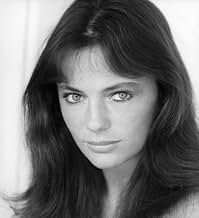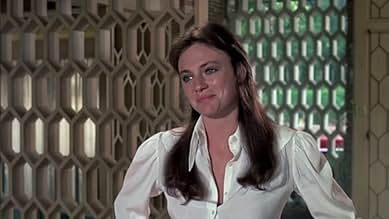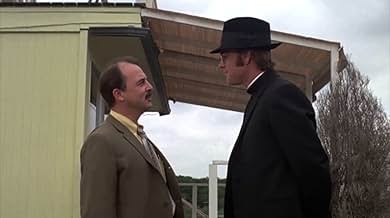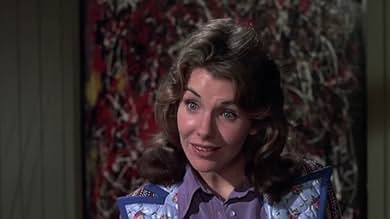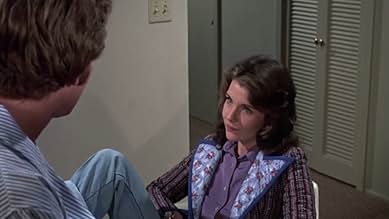VALUTAZIONE IMDb
6,1/10
1366
LA TUA VALUTAZIONE
Un programmatore di computer decide di diventare un ladro. E quando inizia a fare scalpore, un investigatore assicurativo lo insegue. Incontra anche una donna che diventa sua complice.Un programmatore di computer decide di diventare un ladro. E quando inizia a fare scalpore, un investigatore assicurativo lo insegue. Incontra anche una donna che diventa sua complice.Un programmatore di computer decide di diventare un ladro. E quando inizia a fare scalpore, un investigatore assicurativo lo insegue. Incontra anche una donna che diventa sua complice.
- Regia
- Sceneggiatura
- Star
Ollie Ree Alridge
- Maid
- (non citato nei titoli originali)
Jim Antonio
- Poker Player
- (non citato nei titoli originali)
Army Archerd
- Newsman
- (non citato nei titoli originali)
Recensioni in evidenza
Considering that its been close to forgotten, TTWCTD was a pleasant and substantial surprise when I watched it a few years ago.
This is far from a perfect film as it has several flaws. While the caper scenes involving central character Webster McGee's (Ryan O'Neal) are entertaining enough they're hardly groundbreaking and have been done better in other films. And as another reviewer said, the film probably could've done without the segment involving the arrogant chess expert Zukovsky (played by Austin Pendelton). While not without humour, in the context of the rest of the film it's played too broadly by Pendelton and doesn't really fit in.
But there is much of interest in this film that make it well worth catching up with. The central romance between O'Neal and wealthy socialite Jackie (who gives him his chance to move into the upper echelons of society) played by Jacqueline Bisset isn't really that convincing, perhaps deliberately so. McGee's attraction to the vacuous and cold Laura only makes sense in the context of Jill Clayburgh's performance as McGee's ex-wife Jackie. In her brief on-screen time, Jackie comes across as a far more likable persona then the cold and chilly Laura (doubtless this is also because Bisset has always come across as a cold and unlikable personality for mine). But we can see in Jackie's one scene with Webster that she has tics and neuroses that remind Webster of his past and he has moved on with someone far more frivolous and insubstantial.
But the really fascinating part of the film is the relationship between McGee and the insurance investigator Dave Riley. If this film were made today, Riley would most likely be portrayed as a harried, bumbling 'loser' with McGee (and the filmmakers) regularly mocking his failure to catch him at every turn.
But TTWCTD does something highly unusual and daring. It has McGee display immense sympathy and empathy for Riley even as he's doing his best to catch him. Why? Because he knows that he was just like him previously - someone stuck in a dead-end job trying to do their best but feeling immensely dissatisfied about their life and feeling helpless to do anything about it.
It's this relationship which is the real strength of the film, helped especially by Oates' marvellous performance as Riley and helps it stay in the memory long after one has finished watching it.
And while it has its detractors, I also found Henry Mancini's music score very pleasing on the ear.
This is far from a perfect film as it has several flaws. While the caper scenes involving central character Webster McGee's (Ryan O'Neal) are entertaining enough they're hardly groundbreaking and have been done better in other films. And as another reviewer said, the film probably could've done without the segment involving the arrogant chess expert Zukovsky (played by Austin Pendelton). While not without humour, in the context of the rest of the film it's played too broadly by Pendelton and doesn't really fit in.
But there is much of interest in this film that make it well worth catching up with. The central romance between O'Neal and wealthy socialite Jackie (who gives him his chance to move into the upper echelons of society) played by Jacqueline Bisset isn't really that convincing, perhaps deliberately so. McGee's attraction to the vacuous and cold Laura only makes sense in the context of Jill Clayburgh's performance as McGee's ex-wife Jackie. In her brief on-screen time, Jackie comes across as a far more likable persona then the cold and chilly Laura (doubtless this is also because Bisset has always come across as a cold and unlikable personality for mine). But we can see in Jackie's one scene with Webster that she has tics and neuroses that remind Webster of his past and he has moved on with someone far more frivolous and insubstantial.
But the really fascinating part of the film is the relationship between McGee and the insurance investigator Dave Riley. If this film were made today, Riley would most likely be portrayed as a harried, bumbling 'loser' with McGee (and the filmmakers) regularly mocking his failure to catch him at every turn.
But TTWCTD does something highly unusual and daring. It has McGee display immense sympathy and empathy for Riley even as he's doing his best to catch him. Why? Because he knows that he was just like him previously - someone stuck in a dead-end job trying to do their best but feeling immensely dissatisfied about their life and feeling helpless to do anything about it.
It's this relationship which is the real strength of the film, helped especially by Oates' marvellous performance as Riley and helps it stay in the memory long after one has finished watching it.
And while it has its detractors, I also found Henry Mancini's music score very pleasing on the ear.
In 1973, the best chess programs running on the fastest supercomputers could barely play a passable game of chess, much less challenge a master level player such as the Austin Pendleton character would be (newspaper chess columnist for the Houston Chronicle).
There are some humorous scenes, some suspense, some great Houston locations, some really bad 1970s clothes and some interesting architecture,
This film relies mostly on the attractiveness and charm of its leads in their physical prime.
This film relies mostly on the attractiveness and charm of its leads in their physical prime.
Ryan O'Neal gives one of his better, looser performances in this crime-caper, a handsome comedy-drama involving a computer programmer-turned-jewel thief planning a major heist. Warren Oates is the insurance investigator in dogged pursuit, Jacqueline Bisset (at her most lovely) plays a love-interest in on the action, Austin Pendleton is very funny as a nerdy chess pro, and wonderfully blithe Jill Clayburgh makes a big impression in the minor role of O'Neal's ex-wife. Brisk, fairly engaging fluff has tongue wryly in-cheek and is well-directed by Bud Yorkin. This seemed a little flat when it played in theaters, but it works much better on the tube. **1/2 from ****
Ryan O'Neal's performance in "The Thief Who Came to Dinner" (1973) reflects mature professionalism. The story is agreeable enough: Computer programmer Mr. Straight abruptly quits his job to become a jewel-thief.
Walter Hill authored this script before beginning his directorial career. Here, his work takes on a more ironic tone than the stone-cold nature of his other accomplishments ("The Driver," "The Warriors," the screenplay for Peckinpah's "The Getaway"). But when Hill works tongue-in-cheek, as in parts of "The Long Riders" and all of "48 Hours," the results can be crafty and diverting. Here, the jokes don't always work, but one can still appreciate the intelligence behind them.
"Thief" was directed by Bud Yorkin, known primarily for his association with TV producer Norman Lear ("All In The Family"). As a moviemaker, Yorkin falls down on the job. He has a pedestrian talent for setting up visual gags, but there's no payoff. Where the film calls for laughter, there's only a chuckle. Not that "Thief" needed a comic genius behind the camera, but this movie should have been a whole lot better.
Walter Hill authored this script before beginning his directorial career. Here, his work takes on a more ironic tone than the stone-cold nature of his other accomplishments ("The Driver," "The Warriors," the screenplay for Peckinpah's "The Getaway"). But when Hill works tongue-in-cheek, as in parts of "The Long Riders" and all of "48 Hours," the results can be crafty and diverting. Here, the jokes don't always work, but one can still appreciate the intelligence behind them.
"Thief" was directed by Bud Yorkin, known primarily for his association with TV producer Norman Lear ("All In The Family"). As a moviemaker, Yorkin falls down on the job. He has a pedestrian talent for setting up visual gags, but there's no payoff. Where the film calls for laughter, there's only a chuckle. Not that "Thief" needed a comic genius behind the camera, but this movie should have been a whole lot better.
Lo sapevi?
- QuizJacqueline Bisset took over the role of Laura from Charlotte Rampling, who bowed out because of pregnancy. [VARIETY, Mar 15, 1972]
- BlooperTravis is pulled over by police and is asked for the car's registration. In the 1970s, Texas did not require that the registration be kept in the car, and officers did not ask for it. Hollywood got it wrong because in California drivers were required to present their "registration".
- ConnessioniFeatured in Gazap Rüzgari (1983)
I più visti
Accedi per valutare e creare un elenco di titoli salvati per ottenere consigli personalizzati
- How long is The Thief Who Came to Dinner?Powered by Alexa
Dettagli
Botteghino
- Lordo Stati Uniti e Canada
- 679.839 USD
Contribuisci a questa pagina
Suggerisci una modifica o aggiungi i contenuti mancanti

